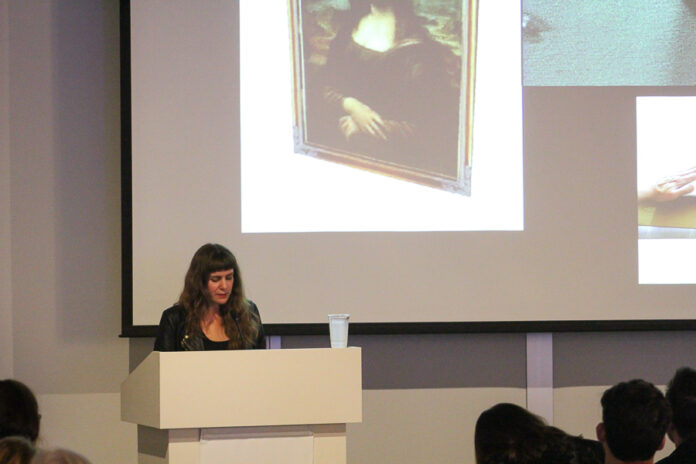Visiting Artist Lecture Series invites The Lab executive director
On Jan. 31, the Department of Art and Art History invited Dena Beard to the Manetti Shrem Museum as a part of the Visiting Artist Lecture Series, which holds events throughout the year. Beard is the executive director of The Lab, a nonprofit experimental music and art space in San Francisco.
Beard began the lecture by explaining the origins of her personal philosophy and how it affects the way she experiences and works with art.
“I’m an anarchist,” Beard told the audience within the first few moments of her lecture. She explained how she’s interested in “dismantling systems of oppression” through the art she helps produce with The Lab.
“My work hinges on the idea that great art dismantles these norms,” Beard said.
She also explained her interest in the “subjectile,” which she defines as the support structure for any artistic work. In particular, her interest lies in subjectiles that “bite back” and force the artist to struggle a bit. She believes that there should be conflict between what an artists wants their piece to be and what it ends up becoming.
When The Lab hosts an artist, Beard opens up the space completely in order for it to become a subjectile space that the artist can quarrel with.
Ariana Shevchuk, a third-year design major and studio art minor, said that Beard’s opinions on the subjectile resonated with her own personal work. Shevchuk said that as an artist, she wants to let go of the pursuit of perfection and “let the work do what it wants to do.”
“It’s about letting your art be what it wants to be, as opposed to designing something and having it come out how you envisioned it originally,” Shevchuk said.
Before Beard began working at The Lab, she earned a master’s degree in art history, theory and criticism from the School of the Art Institute of Chicago. She also worked as an assistant curator at the Berkeley Art Museum and Pacific Film Archive for six years.
Her work as a curator, however, did not stimulate her creatively or intellectually. She felt like a “cog in the machine” and yearned for more meaning in her life. This is why when she was offered a position at The Lab in 2014, she decided to jump straight in.
The Lab is a space that has existed for 35 years but had been severely struggling when Beard was brought in. The space was poorly run, $150,000 in debt and lacked a cohesive purpose. It was a massive undertaking, but Beard knew she was the person for the job.
As Executive Director, Beard decided to “wipe the slate clean” and reconstruct the entire space. She had hardly any money to work with and utilized fundraisers and a Kickstarter campaign in order to get the organization out of debt and back on its feet.
While she wanted to maintain the punk edge that the space had cultivated over the last 35 years, she wanted to add a level of professionalism that would turn the space into a respected and financially solvent business. This would benefit the space and the artists they work to support as well.
Since taking over, Beard has made The Lab a successful non-profit that brings in around $360,000 a year.
This money then goes right back to the artists. The Lab gives out four grants to underrepresented artists each year, ranging from $25,000 to $100,00. When considering the recipients of the grants, Beard works to find artists and pieces that challenge systems and forms found in everyday life. She is interested in tackling systems in life that she sees as oppressive or detrimental to the good of the world.
“I choose people who will change me,” Beard said. These chosen artists then get to completely take over the space during their allotted time with The Lab.
Kayla Sabella-Sandhagen, a second-year art studio major, found the lecture and Beard’s words inspiring.
“I’m ready to go create,” Sabello-Sandhagen said.
Amanda Flowers, a fourth-year English major, said that Beard’s philosophy and what she does with The Lab is inventive.
“It is an interesting use of theory that was applied to art in a way I haven’t seen it,” Flowers said.
More lectures will be held throughout the year for this series. Public lectures are held at 4:30 p.m. in the Manetti Shrem Museum in the Community Education Room. Lectures are free and open to the public. A schedule can be found at the Manetti Shrem website.
Written by: Alyssa Ilsley — arts@theaggie.org




